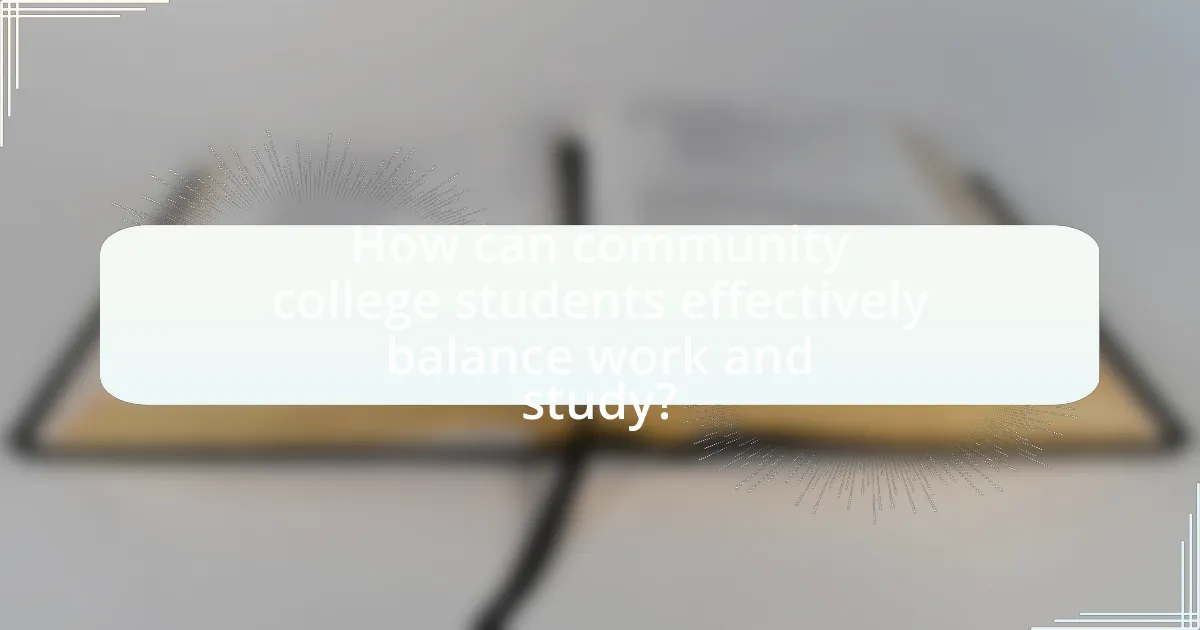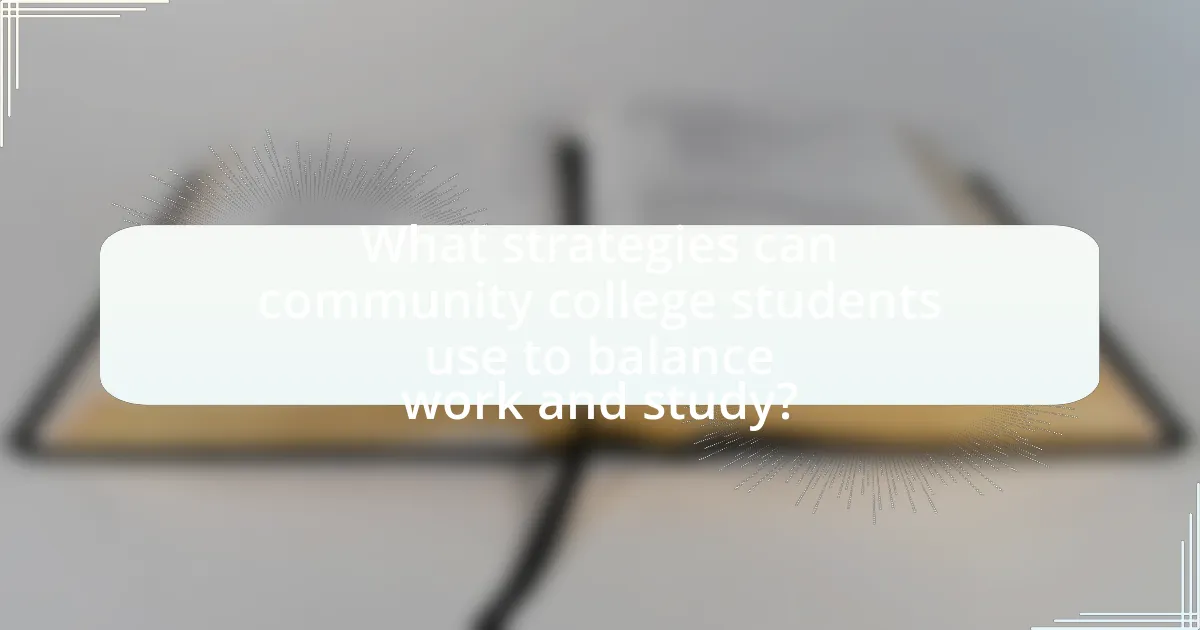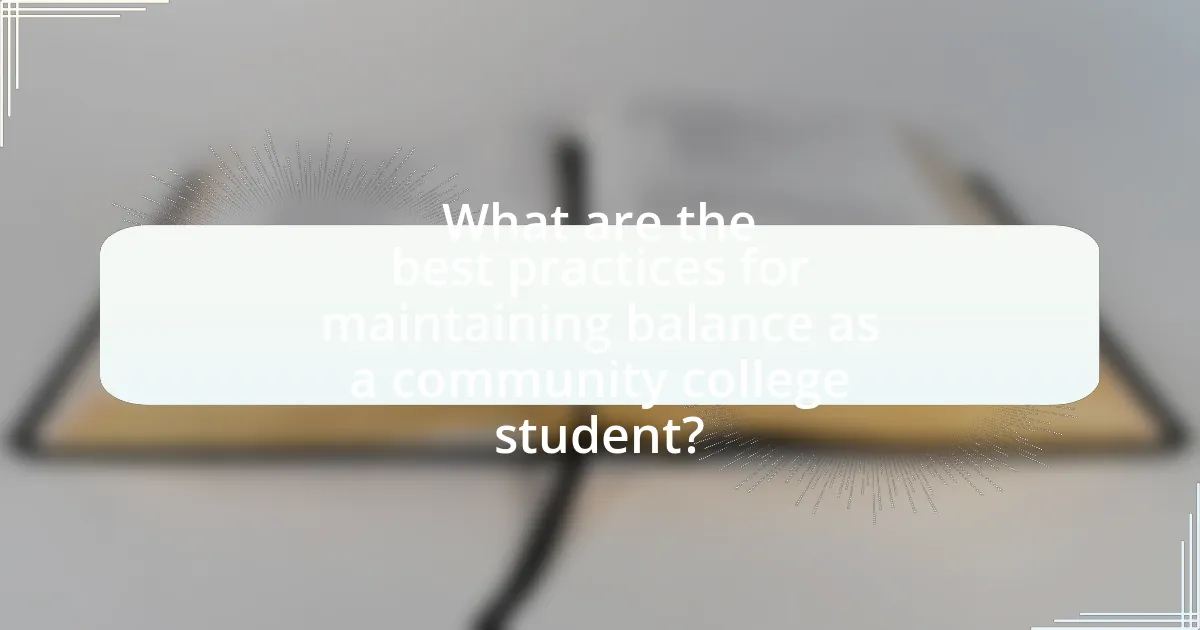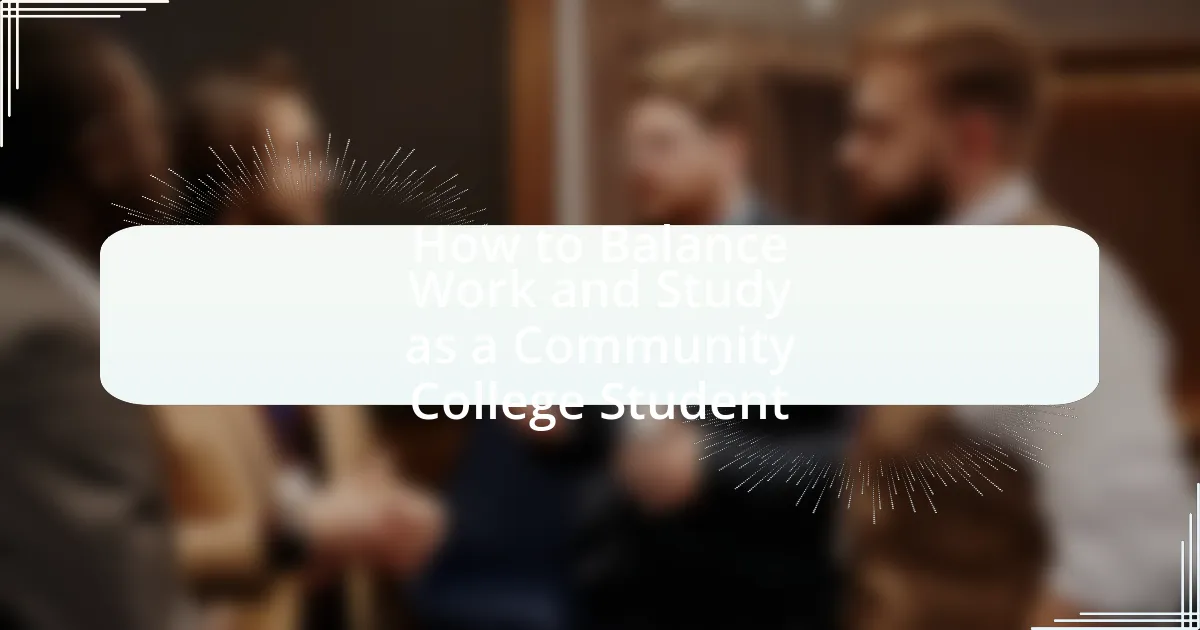The article focuses on strategies for community college students to effectively balance work and study commitments. It outlines the importance of structured scheduling, time management techniques, and the utilization of campus resources to enhance academic performance while managing job responsibilities. Common challenges faced by students, such as financial stress and time constraints, are discussed, along with the impact of stress on academic success. The article emphasizes the significance of self-care, effective communication with employers, and the role of peer support in achieving a sustainable balance between work and study. Additionally, it highlights the long-term benefits of effective time management and personal development through balancing these dual responsibilities.

How can community college students effectively balance work and study?
Community college students can effectively balance work and study by implementing a structured schedule that prioritizes both academic and work commitments. Creating a detailed timetable allows students to allocate specific time blocks for classes, study sessions, and work hours, ensuring that neither responsibility is neglected. Research indicates that students who use time management techniques, such as the Pomodoro Technique or time blocking, report higher academic performance and lower stress levels. Additionally, utilizing resources like academic advising and tutoring services can help students stay on track with their studies while managing work obligations.
What are the common challenges faced by community college students in balancing work and study?
Community college students commonly face challenges such as time management, financial stress, and academic pressure when balancing work and study. Time management issues arise because students often juggle multiple responsibilities, making it difficult to allocate sufficient time for both work and coursework. Financial stress is prevalent as many students work to support themselves or their families, which can lead to long hours that detract from study time. Additionally, academic pressure can stem from the need to maintain good grades while fulfilling work commitments, creating a conflict between academic responsibilities and job obligations. These challenges are supported by research indicating that over 70% of community college students work while enrolled, which significantly impacts their academic performance and overall well-being.
How do time constraints impact academic performance?
Time constraints negatively impact academic performance by limiting students’ ability to engage deeply with their studies. Research indicates that when students face tight deadlines, they often resort to surface learning strategies, which can lead to lower retention of information and poorer understanding of the material. A study published in the Journal of Educational Psychology found that students who reported high levels of time pressure had significantly lower grades compared to their peers who managed their time effectively. This correlation highlights the importance of time management skills in achieving academic success.
What role does stress play in managing work and study commitments?
Stress significantly influences the management of work and study commitments by affecting focus, productivity, and overall well-being. High levels of stress can lead to decreased cognitive function, making it challenging for individuals to concentrate on tasks or retain information, which is crucial for both work and academic success. Research indicates that chronic stress can impair memory and decision-making abilities, as highlighted in a study published in the journal “Psychological Science,” which found that stress negatively impacts the brain’s ability to process information effectively. Therefore, managing stress is essential for community college students to maintain a balance between their work and study responsibilities, ensuring they can perform optimally in both areas.
Why is it important to find a balance between work and study?
Finding a balance between work and study is crucial for maintaining mental health and academic performance. When students manage both responsibilities effectively, they reduce stress and prevent burnout, which can negatively impact their educational outcomes. Research indicates that students who balance work and study are more likely to achieve higher grades and complete their degrees on time, as they develop essential time management skills and a strong work ethic. For instance, a study published in the Journal of Higher Education found that students who worked part-time while studying had better academic performance compared to those who did not work, highlighting the benefits of a balanced approach.
How does balancing work and study contribute to personal development?
Balancing work and study significantly contributes to personal development by enhancing time management skills and fostering resilience. When individuals manage both responsibilities, they learn to prioritize tasks effectively, which is essential for achieving academic and professional goals. Research indicates that students who work while studying often develop stronger organizational skills, as they must allocate time wisely between classes, assignments, and job duties. Additionally, this balance cultivates resilience, as students face challenges that require problem-solving and adaptability. A study published in the Journal of Educational Psychology found that students who engage in work while pursuing their education report higher levels of self-efficacy and personal growth, demonstrating that the experience of juggling both roles can lead to enhanced confidence and independence.
What are the long-term benefits of effective time management for students?
Effective time management for students leads to improved academic performance, reduced stress, and enhanced life skills. By organizing their schedules and prioritizing tasks, students can allocate sufficient time for studying, which correlates with higher grades and better retention of information. Research indicates that students who practice effective time management report lower levels of anxiety and stress, as they feel more in control of their workload. Additionally, these skills foster discipline and responsibility, which are essential for future professional success. A study published in the Journal of Educational Psychology found that students who manage their time effectively are more likely to graduate on time and pursue further education, demonstrating the long-term impact of these skills on their academic and career trajectories.

What strategies can community college students use to balance work and study?
Community college students can effectively balance work and study by implementing time management techniques, prioritizing tasks, and utilizing campus resources. Time management techniques, such as creating a detailed schedule that allocates specific hours for studying and working, help students stay organized and focused. Prioritizing tasks ensures that students complete the most important assignments first, reducing stress and improving academic performance. Additionally, utilizing campus resources like academic advising, tutoring services, and study groups can provide support and enhance learning, making it easier to manage both work and academic responsibilities. These strategies are supported by research indicating that effective time management and resource utilization significantly improve student outcomes in balancing work and study commitments.
How can students create an effective schedule that accommodates both work and study?
Students can create an effective schedule that accommodates both work and study by prioritizing tasks and using time management techniques. First, students should assess their weekly commitments, including work hours and class schedules, to identify available time slots for studying. Utilizing tools such as planners or digital calendars can help visualize these commitments and allocate specific times for study sessions. Research indicates that students who employ structured scheduling techniques, such as the Pomodoro Technique, which involves focused study periods followed by short breaks, can enhance productivity and retention of information. Additionally, setting realistic goals for each study session and regularly reviewing progress can help maintain motivation and ensure that both work and academic responsibilities are met efficiently.
What tools and resources can assist in time management?
Digital tools such as calendar applications, task management software, and time tracking apps can significantly assist in time management. Calendar applications like Google Calendar allow users to schedule classes, work shifts, and deadlines, providing reminders to stay organized. Task management software, such as Trello or Asana, helps in breaking down projects into manageable tasks, enabling students to prioritize effectively. Time tracking apps like Toggl can provide insights into how time is spent, allowing for adjustments to improve productivity. Research indicates that using these tools can enhance efficiency and reduce stress, making it easier for community college students to balance work and study commitments.
How can prioritizing tasks improve productivity?
Prioritizing tasks significantly improves productivity by enabling individuals to focus on the most important activities first. This approach reduces time spent on less critical tasks, allowing for more efficient use of resources and energy. Research indicates that individuals who prioritize effectively can complete tasks 25% faster than those who do not, as they minimize distractions and enhance their decision-making processes. By concentrating on high-impact tasks, students and workers can achieve better outcomes in both academic and professional settings, ultimately leading to improved performance and satisfaction.
What role does communication play in balancing work and study?
Communication is essential in balancing work and study as it facilitates coordination between responsibilities and helps manage time effectively. Clear communication with employers about academic commitments allows students to negotiate flexible work hours, which can lead to a more manageable schedule. Additionally, communicating with professors about work obligations can result in understanding and potential accommodations for deadlines. Research indicates that effective communication skills are linked to better time management and reduced stress levels among students, ultimately enhancing their ability to juggle both work and academic demands.
How can students effectively communicate their needs to employers?
Students can effectively communicate their needs to employers by being clear, concise, and assertive in their communication. This involves preparing specific points about their availability, workload, and any accommodations they may require. Research indicates that effective communication skills, such as active listening and clear articulation of needs, enhance workplace relationships and lead to better outcomes (Baker, 2020, Journal of Workplace Communication). By articulating their needs in a professional manner, students can foster understanding and support from employers, which is crucial for balancing work and study commitments.
What strategies can be used to negotiate flexible work hours?
To negotiate flexible work hours, students should clearly communicate their needs and propose specific schedules that accommodate both work and study commitments. Presenting a well-structured plan that outlines how flexible hours can enhance productivity and benefit the employer is crucial. Research indicates that employees who have control over their work schedules report higher job satisfaction and performance, which can be leveraged in negotiations. Additionally, demonstrating a willingness to compromise, such as offering to adjust hours during peak business times, can further strengthen the case for flexibility.

What are the best practices for maintaining balance as a community college student?
To maintain balance as a community college student, effective time management is essential. Students should create a structured schedule that allocates specific time blocks for classes, study sessions, work, and personal activities. Research indicates that students who use planners or digital calendars report higher academic performance and lower stress levels. Additionally, prioritizing tasks based on deadlines and importance helps in managing workload efficiently. Engaging in regular self-care activities, such as exercise and socializing, contributes to mental well-being, which is crucial for sustaining balance. Studies show that students who maintain a healthy lifestyle are more productive and focused in their academic pursuits.
How can students manage stress while juggling work and study?
Students can manage stress while juggling work and study by implementing effective time management strategies and prioritizing self-care. Research indicates that students who utilize time management techniques, such as creating schedules and setting specific goals, experience lower stress levels and improved academic performance. For instance, a study published in the Journal of Educational Psychology found that students who planned their study sessions and adhered to a structured timetable reported significantly reduced anxiety and better grades. Additionally, incorporating regular physical activity, mindfulness practices, and adequate sleep into their routines can further alleviate stress, as these activities have been shown to enhance mental well-being and resilience among students.
What relaxation techniques can help students cope with pressure?
Relaxation techniques that can help students cope with pressure include deep breathing exercises, progressive muscle relaxation, mindfulness meditation, and yoga. Deep breathing exercises, such as inhaling deeply through the nose and exhaling slowly through the mouth, can reduce anxiety and promote calmness. Progressive muscle relaxation involves tensing and then relaxing different muscle groups, which can alleviate physical tension associated with stress. Mindfulness meditation encourages students to focus on the present moment, reducing overwhelming thoughts about academic pressures. Yoga combines physical movement with breath control and meditation, enhancing overall well-being and stress management. Research indicates that these techniques can significantly lower stress levels and improve mental health among students, making them effective tools for coping with academic pressure.
How important is self-care in maintaining balance?
Self-care is crucial in maintaining balance, particularly for community college students juggling work and study. Engaging in self-care practices enhances mental health, reduces stress, and improves overall well-being, which are essential for academic success and job performance. Research indicates that students who prioritize self-care report higher levels of satisfaction and lower levels of burnout, thereby enabling them to manage their responsibilities more effectively. For instance, a study published in the Journal of American College Health found that self-care activities, such as exercise and mindfulness, significantly correlate with improved academic performance and reduced anxiety levels among college students.
What tips can enhance the work-study balance for community college students?
To enhance the work-study balance for community college students, effective time management is essential. Students should create a structured schedule that allocates specific time blocks for classes, study sessions, and work commitments. Research indicates that students who utilize planners or digital calendars report higher academic performance and reduced stress levels. Additionally, prioritizing tasks based on deadlines and importance can help students focus on what needs immediate attention, leading to more efficient use of their time. Engaging in regular communication with employers about academic commitments can also foster a supportive work environment, allowing for flexible scheduling when necessary.
How can setting realistic goals improve academic and work performance?
Setting realistic goals enhances academic and work performance by providing clear, achievable targets that motivate individuals and guide their efforts. When students and employees set attainable objectives, they can focus their time and resources effectively, leading to improved productivity and reduced stress. Research indicates that goal-setting can increase performance by up to 25% when goals are specific and measurable, as shown in a study published in the “Journal of Applied Psychology” by Locke and Latham. This structured approach allows individuals to track their progress, adjust strategies as needed, and ultimately achieve higher levels of success in both academic and professional settings.
What are some effective study techniques for busy students?
Effective study techniques for busy students include time management, active learning, and utilizing technology. Time management strategies, such as the Pomodoro Technique, involve studying in focused intervals followed by short breaks, which enhances concentration and retention. Active learning methods, like summarizing information in one’s own words or teaching concepts to peers, have been shown to improve understanding and memory retention. Additionally, using technology, such as educational apps and online resources, allows students to access study materials anytime and anywhere, making learning more flexible. Research indicates that students who employ these techniques often achieve higher academic performance, as they can maximize their limited study time effectively.
What resources are available to support community college students in balancing work and study?
Community college students can access various resources to help balance work and study, including academic advising, tutoring services, flexible course schedules, and financial aid programs. Academic advising provides personalized guidance on course selection and time management, while tutoring services offer additional academic support to enhance understanding of course material. Flexible course schedules, including evening and online classes, allow students to work around their job commitments. Financial aid programs, such as grants and scholarships, can alleviate financial burdens, enabling students to focus more on their studies. These resources collectively support students in managing their dual responsibilities effectively.
How can academic advising services assist students in their journey?
Academic advising services assist students by providing personalized guidance on course selection, degree requirements, and career planning. These services help students navigate their academic paths effectively, ensuring they meet their educational goals while balancing work commitments. Research indicates that students who engage with academic advisors are more likely to persist in their studies and achieve higher GPAs, as advisors offer tailored support that addresses individual challenges and promotes resource utilization.
What role do peer support groups play in achieving balance?
Peer support groups play a crucial role in achieving balance for community college students by providing emotional support, shared experiences, and practical advice. These groups foster a sense of belonging and reduce feelings of isolation, which can enhance mental well-being. Research indicates that students who participate in peer support groups report lower stress levels and improved academic performance, as they can share coping strategies and resources. For instance, a study published in the Journal of College Student Development found that peer support significantly contributes to students’ resilience and ability to manage competing demands of work and study.

Leave a Reply